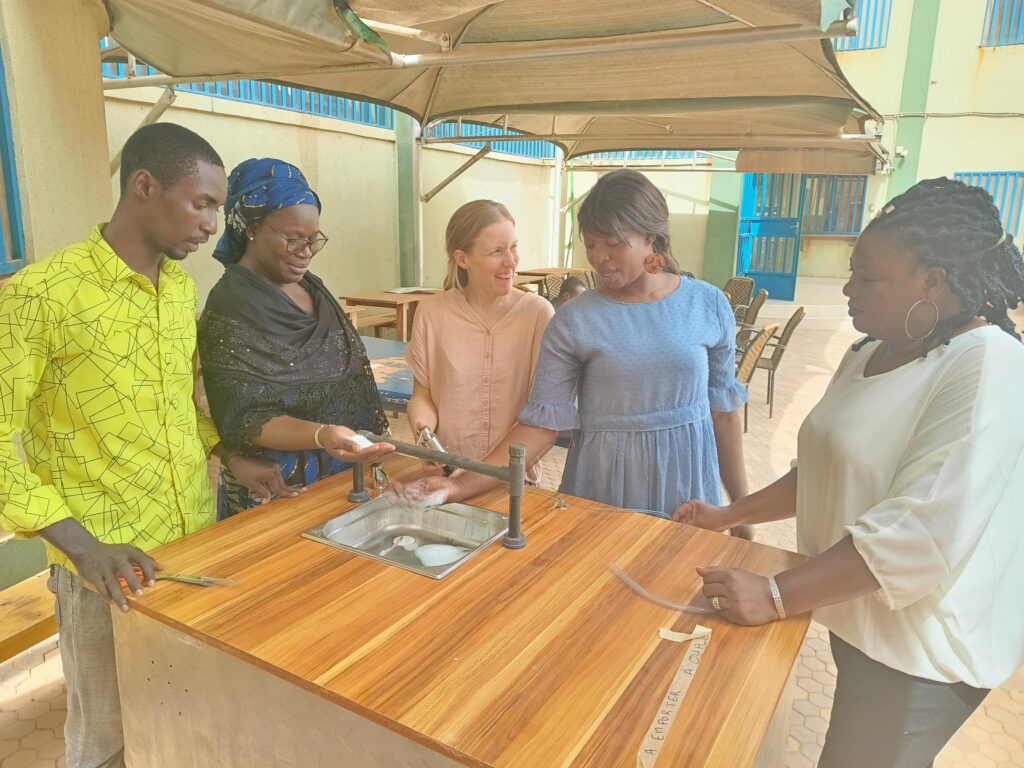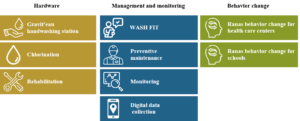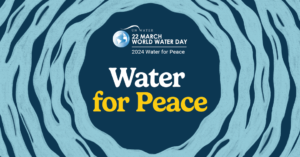Burkina Faso

Context
Boucle du Mouhoun is the fifth most impacted region in Burkina Faso for internally displaced persons (IDPs), with 32’000 in June 2020. The lack of access to basic services has placed significant insecurity on the local population.
Tdh supports health centres in the 6 health districts in Boucle du Mouhoun, and maintains strong relationships with the health and administrative authorities.
Our project focuses on primary HCFs in the Boucle du Mouhoun region.
Project profile
| Focus | Primary health care facilities |
| Location(s) | 2 health districts in the Boucle du Mouhoun Region: Toma and Tougan |
| Roles of consortium partner(s) involved | – Tdh (lead): coordination, implementation strategy and adoption at scale – Swiss TPH: impact evaluation – RANAS: behaviour change strategy – EPFL and Martin Systems: technical innovations |
| Local and strategic stakeholders | – Ministry of Health – WASH Cluster |
| Project overview | In Burkina Faso, the hands4health project is implemented in health care facilities in the Boucle du Mouhoun Region. To achieve the project’s primary goal – developing and implementing a holistic approach to hand hygiene, water quality and sanitation, we will start by assessing the WASH needs and users’ practices and preferences regarding hand hygiene in HCFs of the target area. Based on these data and on the results of a first pilot phase, during which different solutions will be tested, the systemic approach will be finalised, comprising both hardware (handwashing stations) and software components (RANAS behaviour change methodology). It will then be implemented in 20 HCFs during the second phase of the project. The results of the intervention will be monitored throughout to evaluate the impact of the approach in terms of health and hygiene practices. |
| Main activities | – Gender-sensitive mapping of the WASH needs of different user groups in HCFs – Assessment of the local market in terms of availability of suitable materials and skills – Field evaluation of different design options – Development of a catalogue of design options suitable for different user groups and production methods – Collection of baseline data on factors influencing users’ behaviour, acceptance and preferences of technologies/concepts – Installation of Gravit’eau handwashing stations in 20 HCFs, including training on how to build, operate, maintain and monitor the systems at the local level – Implementation of the behaviour change techniques developed from the analysis of the baseline data and evaluation of their effect – Strengthening of local management and monitoring capacities through the implementation of WASH FIT, preventive maintenance and digital data collection – Submission of the research protocol for the study on the health impact of the intervention to the local Ethics Committee – Training of local collaborators on the data collection process and baseline and follow-up surveys (before and after implementation, respectively) in 20 HCFs – Development of the Ranas4HCF toolkit with data and evidence-based behavior change activities for handwashing with soap tailored to HCFs – Theory of change workshops with local stakeholders and dissemination of results supporting internal take-up by other country offices |
| Expected results / products | – Local production of context-specific, user-centered designs of handwashing stations – Enhanced hand hygiene practices amongst direct users (health care staff, patients, visitors) and the community in general – Local collaborators certified as RANAS experts – Evidence on the health impact of the implemented approach for users – Improved understanding of the WASH ecosystem in HCFs in Burkina Faso |









News on h4h activities in Burkina Faso
- hands4health protocol paper published
 Disseminating the hands4health approach The hands4health protocol paper entitled “Assessing the Effectiveness of a Multicomponent Intervention on Hand Hygiene and Well-Being in Primary Health Care Centers and Schools Lacking Functional Water Supply in… Read More »hands4health protocol paper published
Disseminating the hands4health approach The hands4health protocol paper entitled “Assessing the Effectiveness of a Multicomponent Intervention on Hand Hygiene and Well-Being in Primary Health Care Centers and Schools Lacking Functional Water Supply in… Read More »hands4health protocol paper published - World Water Day 2024
 The hands4health intervention focuses on conflict-affected areas in Mali, Burkina Faso, Nigeria and Palestine/West Bank. The consortium is committed to improving the water, sanitation and hygiene systems in primary schools and health care… Read More »World Water Day 2024
The hands4health intervention focuses on conflict-affected areas in Mali, Burkina Faso, Nigeria and Palestine/West Bank. The consortium is committed to improving the water, sanitation and hygiene systems in primary schools and health care… Read More »World Water Day 2024